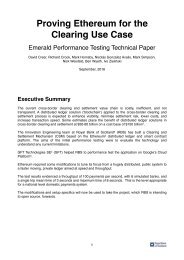Bitcoin and Cryptocurrency Technologies
1Qqc4BN
1Qqc4BN
Create successful ePaper yourself
Turn your PDF publications into a flip-book with our unique Google optimized e-Paper software.
kind of business that will h<strong>and</strong>le large volumes of currency, you’ll need to talk to a lawyer who<br />
underst<strong>and</strong>s these rules.<br />
7.7: Regulation<br />
Now let’s directly address the 'R' word — regulation. Regulation often gets a bad name, especially<br />
among the kind of people who tend to like <strong>Bitcoin</strong>. As the argument goes, regulation is some<br />
bureaucrat who doesn't know my business or what I'm trying to do, coming in <strong>and</strong> messing things up.<br />
It's a burden. It's stupid <strong>and</strong> pointless. This argument is common <strong>and</strong> well understood, <strong>and</strong> while it’s<br />
often at least partially correct, we won’t repeat it here.<br />
Instead, in this section we’ll look in some detail at reasons why regulations might sometimes be<br />
justified, because that argument is not as well understood. To be clear, the fact that we're spending<br />
most of this section talking about why regulation might be good shouldn't be read as an endorsement<br />
of widespread regulation. It's simply that we want to bring a bit more balance to the discussion in a<br />
community where regulation is often considered to be inherently bad.<br />
The bottom line argument in favor or regulation is this: when markets fail <strong>and</strong> produce outcomes that<br />
are bad — <strong>and</strong> agreed to be bad by pretty much everyone in the market — then regulation can step in<br />
<strong>and</strong> try to address the failure. So the argument for regulation, when there is an argument, starts with<br />
the idea that markets don't always give you the result that you'd like.<br />
Let’s make this a bit more precise, using terms from economics. What worries us is a market failure,<br />
<strong>and</strong> by that we don’t simply mean that something bad is happening or somebody feels they are<br />
getting ripped off or treated unfairly. We mean that there is an alternate allocation of goods to the<br />
market participants that would result in everybodybeing better off, or at least not worse off. Such an<br />
alternate allocation is called a Pareto improvement.<br />
Lemons market.Let’s discuss one way in which the market can fail, a classic example called the<br />
lemons market. The name originated in the context of selling cars. Let's say that all cars are either of<br />
low quality or high quality (with nothing in between). A high‐quality car costs a little bit more to<br />
manufacture than a low‐quality car, but it's much, much better for the consumer who buys it.<br />
If the market is operating well (if it’s efficientas economists call it) it will deliver mostly high‐quality<br />
car to consumers. That’s because even though the high‐quality car is a bit costlier, most consumers<br />
prefer it <strong>and</strong> are willing to pay more for it. So under certain assumptions a market will provide this<br />
happy outcome.<br />
On the other h<strong>and</strong>, let's suppose customers can't tell low‐quality cars apart from high‐quality cars. A<br />
low‐quality car (a lemon) sitting on the lot may look pretty good, but you can't really tell if it's going to<br />
break down tomorrow or if it's going to run for a long time. The dealer probably knows if it's a lemon,<br />
but you as the customer can't tell the difference.<br />
209









